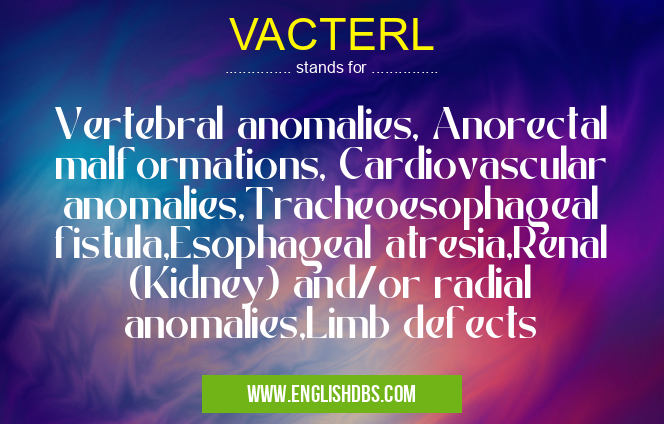What does VACTERL mean in MEDICAL PHYSICS
VACTERL is an acronym that stands for a group of birth defects that often occur together. These defects can affect different parts of the body, including the spine, anus, heart, trachea, esophagus, kidneys, and limbs.

VACTERL meaning in Medical Physics in Medical
VACTERL mostly used in an acronym Medical Physics in Category Medical that means Vertebral anomalies, Anorectal malformations, Cardiovascular anomalies,Tracheoesophageal fistula,Esophageal atresia,Renal (Kidney) and/or radial anomalies,Limb defects
Shorthand: VACTERL,
Full Form: Vertebral anomalies, Anorectal malformations, Cardiovascular anomalies,Tracheoesophageal fistula,Esophageal atresia,Renal (Kidney) and/or radial anomalies,Limb defects
For more information of "Vertebral anomalies, Anorectal malformations, Cardiovascular anomalies,Tracheoesophageal fistula,Esophageal atresia,Renal (Kidney) and/or radial anomalies,Limb defects", see the section below.
VACTERL Association
The VACTERL association is a rare condition that affects approximately 1 in every 10,000 to 40,000 live births. It is more common in boys than in girls. The exact cause of the VACTERL association is unknown, but it is thought to be caused by a combination of genetic and environmental factors.
Symptoms of VACTERL
The symptoms of VACTERL can vary depending on which defects are present. Some of the most common symptoms include:
- Vertebral anomalies, such as hemivertebrae or butterfly vertebrae
- Anorectal malformations, such as imperforate anus or rectal atresia
- Cardiovascular anomalies, such as ventricular septal defect or tetralogy of Fallot
- Tracheoesophageal fistula (TEF), a connection between the trachea and esophagus
- Esophageal atresia (EA), a blockage of the esophagus
- Renal (kidney) anomalies, such as horseshoe kidney or pelvic kidney
- Radial anomalies, such as thumb hypoplasia or radial clubhand
- Limb defects, such as phocomelia or ectrodactyly
Diagnosis of VACTERL
The diagnosis of VACTERL is based on a physical examination and a review of the child's medical history. Imaging tests, such as X-rays and MRIs, may also be used to confirm the diagnosis.
Treatment of VACTERL
The treatment of VACTERL depends on the specific defects that are present. Treatment may include surgery, medication, and therapy. The goal of treatment is to improve the child's quality of life and to prevent future complications.
Conclusion
VACTERL is a rare but serious condition that can affect multiple organ systems. The symptoms of VACTERL can vary depending on which defects are present. Treatment for VACTERL depends on the specific defects that are present and the goal is to improve the child's quality of life and to prevent future complications.
